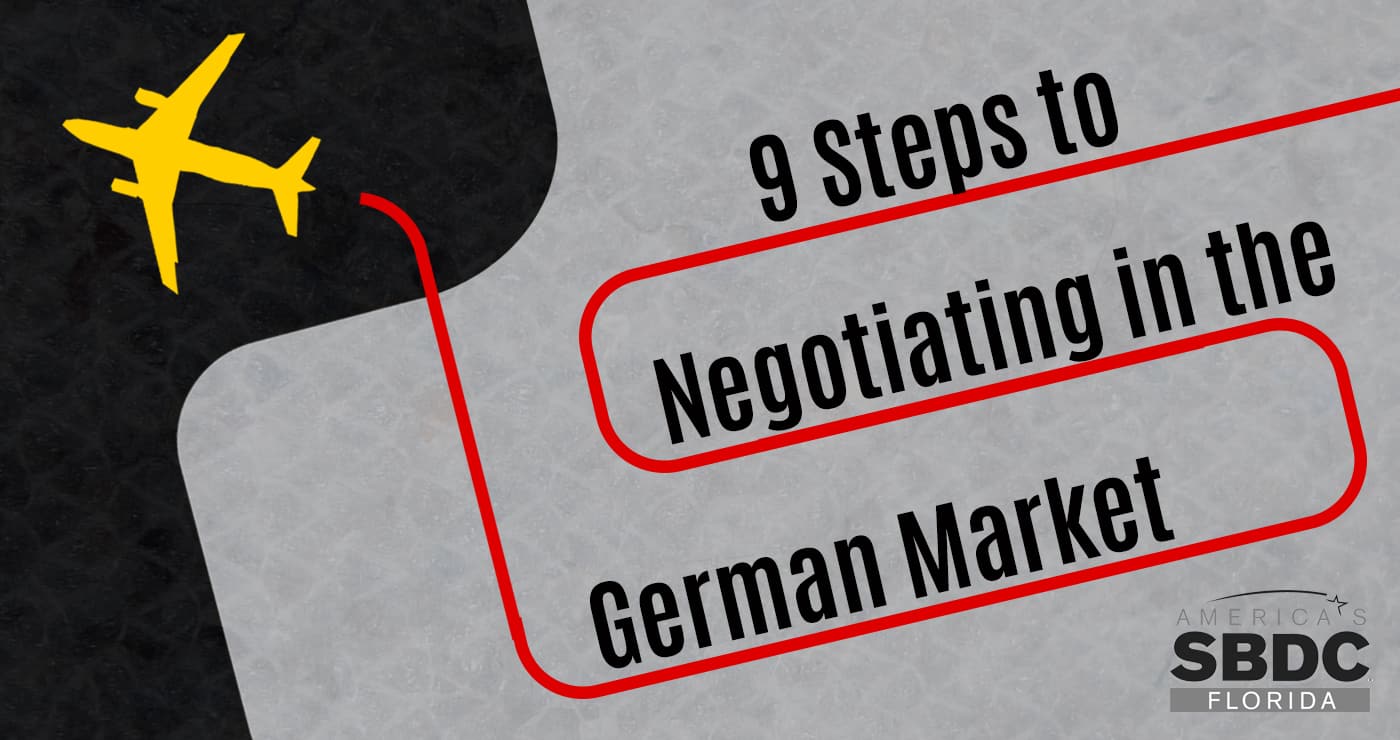9 Steps to Negotiating in the German Market

There’s no doubt that the new nonstop Lufthansa flight from Tampa International Airport to Frankfurt will bring the business communities closer together. With so many opportunities to attend tradeshows, business owners are sure to meet quality sales leads. As you begin to identify and contact potential trading partners, it may surprise you to know that closing on the deal takes some time.
To secure new sales in Germany, it is important to understand and follow the German way of doing business. German’s aspire to what is called Leistungswettbewerb. Pinar Akman explains this term well in, The Concept of Abuse in EU Competition Law: Law and Economic Approaches. In summary, the word refers to performance improvements in efficiency as the basis for improving profits. This means that German sales strategies are strongly product-oriented, built on the confidence that a good product will sell itself.
Additionally, Germans place a high premium on customer satisfaction. They pay close attention to their customer’s needs. Therefore, they might want to know your product features and production processes inside and out before making a deal. This practice comes from the German belief that a good-quality product built on a great production line will do far more for the bottom line than anything else.
Successful relations between German distributors and foreign producers often develop into close relationships. Since German’s believe that they are working together with you to fine tune and sell a good product, forming a close bond is key.
For successful market entry, use the following 9 Steps to Negotiating in the German Market as a guide to turn that new German business contact into your next trading partner:
- Be ready to back up your business pitch. Be prepared to provide high quality data-driven information. Germans will thoroughly review your data, which should be well documented and thoroughly cited.
- Be prepared to deliver. Germans will question you on your readiness to perform as proposed.
- Watch your time. Avoid what they could see as over elaborating. Appropriate time usage is highly valued in Germany. Likewise, do not be late and be sure to stay on schedule throughout meetings.
- Price close to the amount you want to sell. The prices you start with in negotiations should be very close to their anticipated final price. Numbers are very important to Germans, so plan pricing accordingly.
- Have clear and concise terms and conditions. German contracts are less detailed than U.S. purchase orders and other commercial contracts. Once a contract is made in Germany, it is expected to be honored to the letter. Therefore, the constraints and sanctions typical of U.S. commercial contracts are not needed.
- Focus on German market needs and avoid direct country comparisons. Effectively demonstrate how well your product works for the German customer’s unique needs and requirements. Do not imply similarity between the two markets, such as, “Our products are very successful in the U.S., so they will sell very well in Germany.”
- Let the facts speak for themselves. Be sure to provide data comparing and contrasting your product with others without demeaning the competition. German companies like to shop around. They usually do not agree to a deal immediately.
- Negotiation style is formal. Titles are very important to Germans. They prefer to deal with titled or degreed individuals, so state your credentials. Address people by their full title, no matter how extraordinarily long it may seem. The same applies when addressing a letter.
- Be helpful and follow-up through the sales process until a decision is reached. Expect a great deal of written communication. Germans document heavily to back up decisions and keep record of discussions. Remember that by engaging your counterpart each step of the way, you are more likely to get the results you want sooner.
[blog_list thumb=”medium” showposts=”1″ post_content=”full” category_in=”343″ disable=”image,meta,more”]




